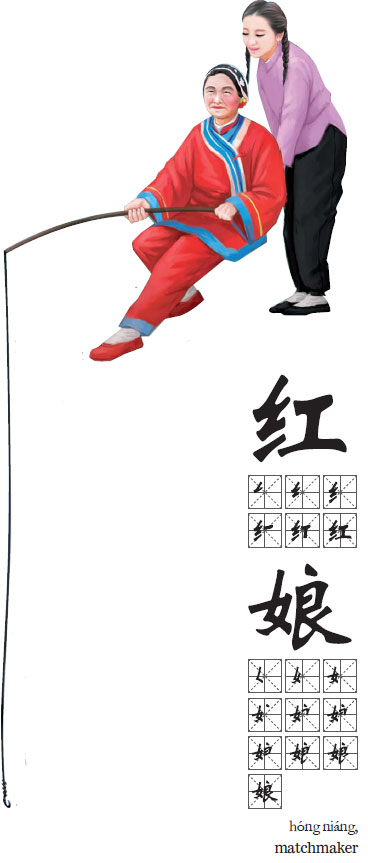Make me a match

In many rural areas of China, the traditional role of matchmaker persists and can still be a profitable business
To varying degrees distant from the online realm, rural romance is a little more traditional. There's an old adage of the feudal age: "Marriage should be arranged by parents' orders and the matchmaker's words."
While this stage of history is over, it turns out that old matchmakers die hard. And, when one considers the lack of online services in China's more rural regions, this would obviously be where matchmakers shine.
Matchmakers take a wide range of roles in the marriage process, and it's not surprising that this sort of service brings with it a relatively high income in impoverished regions.
It's important to note that "matchmaker" is not exactly a job title; it's a cultural mainstay. Whoever performs the act of getting a couple together and seeing it through to the end could be called a matchmaker, but it is still an important position. Even without money changing hands, the matchmaker holds an important position in the wedding party.
In reality, it's not all that different from a dating website. Interested parties tell the matchmakers their requirements and their conditions and when the matchmaker finds someone suitable, a blind date is arranged. That's all pretty standard eHarmony stuff, but the rural matchmaker takes things further. The matchmaker will then introduce the two families. If that goes well, then the matchmaker organizes an engagement dinner. After that, it's all over but the crying.
But, sometimes, the sparks just won't fly; even then the matchmaker gets something out of it. As the saying goes, "successful or not, treat the matchmaker to dinner". It's usually the male side that has to pay off the matchmaker at the end of a bad match - perhaps a few hundred yuan for the phone bills, maybe a nice dinner, candies, booze, cigarettes. Whatever it is, the matchmaker doesn't leave empty-handed.
Despite the matchmaker service being viewed as a dying practice, it's already evolved into a business in some areas. Some matchmakers run restaurants where they often take their clients. "Of course we know about that, but that's the rule," says a bachelor surnamed Sun in Liaohua, Liaoning province, who has been led by a matchmaker to the same restaurant four times.
However, there is more myth and poetry to this position than meets the eye. This process was apparently derived from tradition, namely the "six ritual steps" or liuli (六礼), and each step requires a matchmaker. Traditionally, the matchmaker would propose to the girl on behalf of the young man's family, in the process obtaining the girl's shengchen bazi (生辰八字), which translates to "the date of birth and the eight characters of the horoscope", for divination. Presents would be sent to the betrothed's family along with a date for the wedding.
The wedding, for the matchmaker, was payday, the place where the matchmaker could receive her hongbao, a red envelope with money, from the groom's family. It's a long way to go for a very tenuous paycheck.
Today, things are a bit simpler, but matchmakers also have an extra duty: negotiating the dowry.
In truth, like most bribes, it's disguised as a gift. According to custom, the hopeful groom should give the bride's family betrothal gifts before the wedding as reflection of the family's wealth and sincerity. Just a few decades ago, this was easier - a man only needed to prepare the "four big items" (四大件) for his marriage: a bicycle, a wristwatch, a radio, and a sewing machine. But, with modernity, those have transformed into jewelry, a house, a car and cash. This can be quite a task for people with relatively low incomes, and with China's gender imbalance, families will do whatever they can to keep their children from becoming "leftover men".
According to Beijing Youth Daily, over the past 20 years, there were more than 120 males born for every 100 females, and this imbalance has caused inflation in the price of a bride. Poor rural families, where young men cannot afford such dowries, are suffering the most.
As such, it's a truth universally acknowledged that a man in possession of no fortune will be in want of a matchmaker. Matchmakers, with their Rolodex of women in need of a husband, represent these unmarried men to negotiate with target women about the dowry, helping them to control the budget, kind of like love brokers.
But, let's not forget, matchmakers are also looking to get paid. As a result, hopeful young grooms can add a hefty "thank-you-matchmaker" hongbao to their list of wedding expenses. A century ago, the fee could be as low as a few dozen yuan. Today? It could be tens of thousands.
The young men, of course, aren't the only ones in the equation. Prospective brides are lumped into different categories based on their appearance, age, family wealth, and education. The end result of that equation is the price of a rural bride.
Take educational background as an example: according to a report from the China Youth Daily, in a village in Henan province, women with a bachelor's degree are worth a 150,000 yuan ($22,870; 20,451 euros) dowry, those with a three-year college education are worth 120,000 yuan, and those who graduated from vocational secondary schools deserve 100,000 yuan. The imbalanced gender ratio has also led to a lack of balance in supply and demand in the marriage market. In certain places, a divorced woman without any education can still attract many suitors.
Matchmakers often share information and use their connections to share a take of the wedding booty. Sadly, though, this isn't behind the scenes work that ends with one matchmaker taking a single gift. Many matchmakers try to involve as many people as they can in the matchmaking. The China Youth Daily reported in 2014 that in Handan, Hebei province, there was a marriage involving a total of 18 matchmakers.
"You should feel lucky that you can still find a girl for a blind date," is what rural matchmakers often say to seal the deal.
Sexual discrimination gave birth to the gender imbalance, and now that gender imbalance is taking a toll in the form of matchmaker inflation. It's unclear what most matchmakers think of this, but they'll probably tell you - for a price.
Courtesy of The World of Chinese, www.theworldofchinese.com
The World of Chinese


(China Daily European Weekly 06/10/2016 page23)
Today's Top News
- Wake-up call for Europe to review its dependency: China Daily editorial
- China reports 5% GDP growth in 2025
- Return capsule of Shenzhou XX safely returns to Earth
- Sanya rises as magnet for Russian tourists
- China's steady opening-up for Asia-Pacific economic growth
- Blueprint seen as a boon for entire world





























